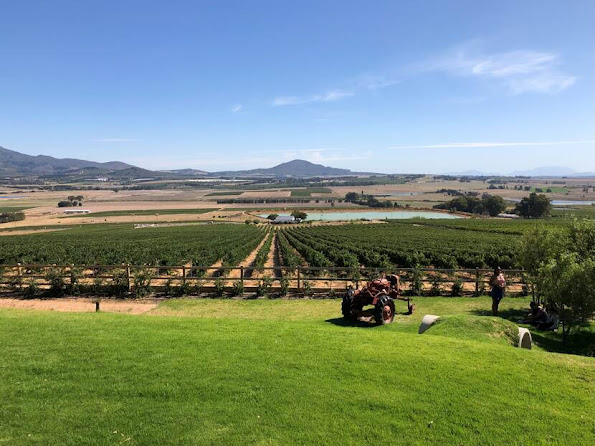Tuesday, May 13, 2025
Afrikaners Coming To America
Saturday, April 26, 2025
Ukraine Seeks Diplomatic Ties With South Africa
Monday, March 24, 2025
The Expulsion of Ebrahim Rasool and South Africa's Response
Wednesday, February 5, 2025
South Africa Repeals Expropriation Act 63 of 1975
South Africa is engaging in a new policy of land reform. The repeal of the Expropriation Act 63 of 1975 represents an effort to eliminate the remains of the Apartheid regime. Land distribution was made unequal by racist laws and practices from 1948 to 1994. The majority of South Africans want to see land distribution. White farmers in the past exploited land and labor, while the black majority was impoverished. The repeal of the Expropriation Act 63 of 1975 is constitutional. A concern about property rights have been discussed by those who oppose reforms. The land was stolen by the Afrikaners and similar to Zimbabwe many were displaced. The expropriation of land under the new law is not to enrich or displace populations. It is giving justice to those who were under colonial rule and racial segregation. The debate over compensation will be contentious. The South African Constitution and courts have to determine if compensation is to be given. Section 12 explains the conditions for transactions. Some object to this on the basis of the basis of the oppression that was inflicted by the white minority ruled regime. Afrikaners continue to benefit from past violence and discriminatory practices of the past. Repeal old laws and new legislation might not be enough. The ANC must embark on wider economic empowerment programs. Strengthening the rand and expanding trade across Africa ensures a better future. Land reform and distribution is the first step to South Africa's economic improvement.
Saturday, October 26, 2024
The 2024 BRICS Summit
Saturday, June 22, 2024
Nelson Mandela Speaks of Tolerance (2006)
Tuesday, June 11, 2024
The Increase of Protests Across Africa
Thursday, January 25, 2024
South Africa's International Court of Justice Case Against Israel
Friday, September 15, 2023
A Major Goal of The New Development Bank
Saturday, June 3, 2023
More Countries Want To Join BRICS
Wednesday, May 17, 2023
African Leaders Are Proposing A Peace Plan To The Russia-Ukraine War
Wednesday, April 12, 2023
BRICS Is Developing A New Currency
Friday, October 21, 2022
South Africa Pledges Its Support To The Saharawi Arab Democratic Republic
Thursday, September 8, 2022
Queen Elizabeth And The Imperial Legacy
Sunday, December 26, 2021
Desmond Tutu Wins The Nobel Prize (1984)
Desmond Tutu( 1931-2021) was a priest, theologian, and anti-apartheid activist. He was one of the figures leading the fight against white minority rule. His efforts got him recognition and in 1984 he won the Nobel Prize. Tutu was criticized for taking a stance that was based on non-violent resistance . The Apartheid regime was inflicting serious harm to the black population with torture and police brutality. Peaceful methods would not be effective against a government based on violence. Tutu was interviewed by Dan Rather in this news report. Desmond Tutu explained South Africans were frustrated with the policy of constructive engagement. The policy really was a means of protecting the regime from international criticism. By 1994 the regime was defeated not by violent means, but through a democratic election. Tutu continued to remain active and also criticized the ANC for failing to adhere to its political promises .
Sunday, November 14, 2021
F.W. de Klerk's Last Public Statement (2021)
Wednesday, July 14, 2021
Demonstrations and Civil Unrest Occur After Former South African President Jacob Zuma Is Jailed
President Jacob Zuma has been jailed. The accusations of corruption brought criminal charges. The aftermath was that demonstrations broke out from the verdict. An appeal was denied was denied by the high court. Currently, demonstrations are being held in various cities and townships. The military has been deployed to deal with the violence and reported looting in the country. His support among the rural poor is strong and Zuma does retain loyal followers. President Zuma was a dominant force in South African politics. He was charged wit contempt of court for refusing to appear to answer questions about corruption during his administration from 2009 to 2018. The reason Zuma has support is that he was willing to programs of economic distribution . This is very popular among South Africans who experience the harsh conditions of economic inequality. The apartheid regime impoverished the black majority and the ANC has failed to reverse the damage of the past. President Jacob Zuma promised a change that was refreshing to young voters living in poverty. The reason supports still follow him was that he was actually trying to improve the conditions of South Africa. Despite charges related to money laundering, arms deals, and contempt of court many think this has a political motivation. The imprisonment of former Jacob Zuma will only divide the country more.













